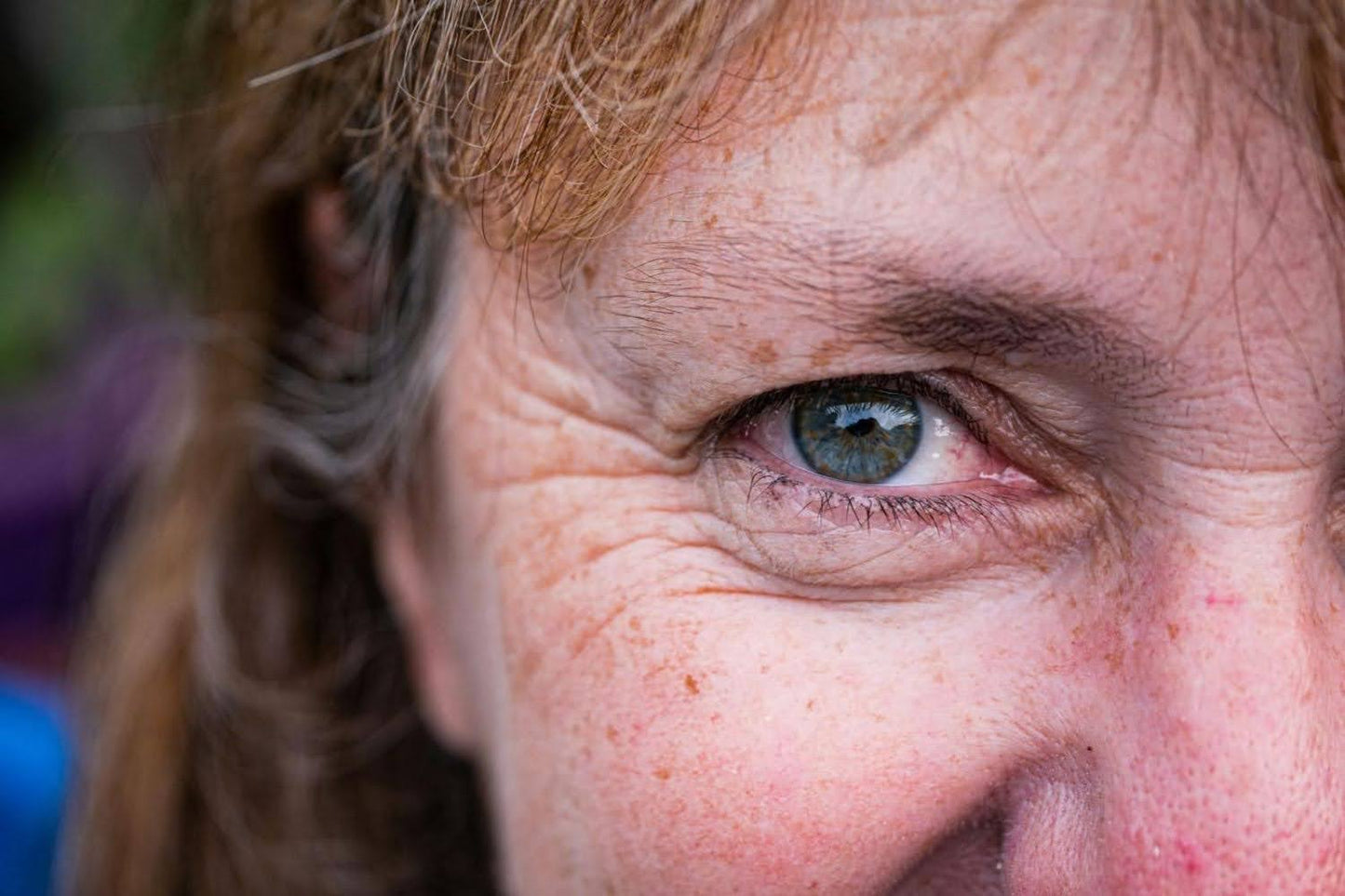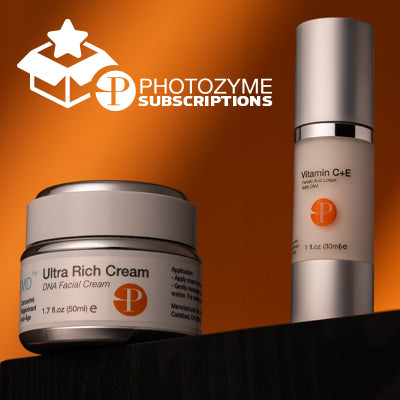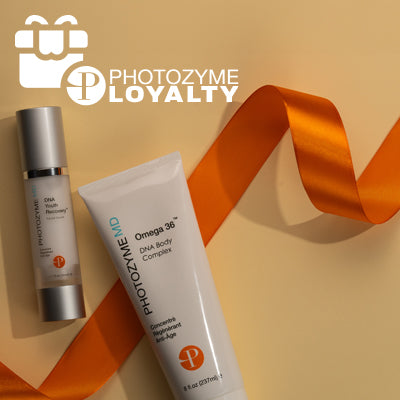
Key Takeaways:
- Essential Ingredients: Peptides, antioxidants, hyaluronic acid, retinoids, niacinamide, and SPF are incorporated to address common aging skin concerns such as dryness, fine lines, and wrinkles.
- Daily Routine: Establish a consistent morning skincare regimen that includes gentle cleansing, toning, serums, moisturizing, sunscreen, and eye cream to protect and rejuvenate aging skin.
- Avoid Pitfalls: Avoid common skincare mistakes like skipping sunscreen, over-exfoliating, neglecting the neck and décolletage, and using harsh chemicals that can accelerate aging.
At Photozyme, we understand that knowledge and the right products are key to effective skincare. With advances in DNA repair technology and a deep commitment to nurturing skin health, we offer solutions designed to protect your skin against the impacts of aging and environmental stressors.
Aging is a natural part of life, but that doesn't mean we have to accept the visible signs that come with it without a fight. As our skin matures, a more tailored approach to skincare that addresses the underlying causes of aging is required. Implementing the best skincare routine for aging skin can significantly help maintain a youthful complexion, reducing the appearance of fine lines, wrinkles, and other signs of aging.
In this article, we will explore how you can best keep your skin looking radiant with an effective skincare regimen for mature skin types.
Understanding Aging Skin
As our skin ages, it undergoes several changes that can impact its texture, appearance, and overall health. Understanding these changes is crucial for developing an effective skincare routine designed for aging skin.
Here are some of the primary factors involved:
- Decreased Collagen Production: Collagen is a protein that gives skin its elasticity and firmness. As we age, our bodies produce less collagen, developing fine lines and wrinkles.
- Reduced Skin Cell Turnover: Younger skin regenerates quickly, but as we get older, skin cell turnover slows down.
- Moisture Loss: Aging skin often experiences a decrease in its ability to retain moisture, leading to dryness and accentuating wrinkles' appearance.
- Thinning of the Epidermis and Dermis: As we age, the outer and middle layers of the skin thin out, decreasing their overall resilience and making them more susceptible to damage.
- Sun Exposure and Photoaging: Years of exposure to the sun's ultraviolet rays can significantly damage the skin, contributing to premature aging and increasing the risk of skin cancer. This process is known as photoaging.
Common Signs Of Aging And Their Causes
As skin ages, it undergoes various changes, which can manifest as different visible signs. Understanding these signs and their underlying causes can help you choose the most effective skincare strategies and products to maintain a youthful appearance.
Fine Lines And Wrinkles
Wrinkles and fine lines are arguably the most common signs of aging, primarily appearing on the face, neck, and hands. These occur due to the natural decrease in collagen and elastin production as we age, which reduces skin elasticity and firmness. External factors like UV exposure, pollution, and lifestyle choices (such as smoking or poor diet) can accelerate this process.
Dryness And Loss Of Radiance
Aging skin often becomes drier and duller. The skin's natural oils decrease with age, reducing moisture retention. Additionally, the turnover rate of skin cells slows, leading to a buildup of dead cells on the surface, which can make the skin appear less vibrant.
Hyperpigmentation And Age Spots
Age spots, also known as liver spots or sunspots, and areas of hyperpigmentation often occur in older adults. These are typically a result of prolonged exposure to UV radiation, which increases melanin production, leading to uneven skin tone and dark spots. Genetics also affect how susceptible an individual is to hyperpigmentation with age.
Sagging Skin
As the skin's structural proteins (collagen and elastin) degrade and facial fat is lost, the skin begins to sag and lose its youthful contour. Gravity also plays a role, pulling the skin downwards over time.
Enlarged Pores
Pores may appear larger as you age due to decreased skin elasticity and the cumulative effects of sun damage and other environmental aggressors. This can contribute to an uneven skin texture, making the skin's surface look rough and uneven.
Steps For A Morning Skincare Routine
Developing an effective morning skincare routine is crucial for protecting aging skin and maximizing the benefits of your skincare products throughout the day.
Here’s a step-by-step guide tailored for those looking to combat signs of aging and maintain radiant, youthful skin:
Cleansing
Start your day with a gentle cleanser to remove overnight build-up and prepare your skin for other products. Opt for a low-pH, hydrating cleanser that respects your skin’s natural barrier, avoiding harsh scrubbing motions.
Toning
Apply a hydrating toner to help balance your skin’s pH and promote better absorption of the following skincare products. A formula enriched with antioxidants or hydrating ingredients can provide added benefits.
Serums
After toning, apply a serum that targets specific concerns. Photozyme’s DNA repair serums are particularly beneficial for aging skin, as they help correct damage at a molecular level and promote the skin’s natural repairing process.
Moisturizer
Use a moisturizer that fits your skin type and contains anti-aging ingredients like peptides, antioxidants, and niacinamide. This helps lock in moisture and provides a protective barrier against environmental aggressors.
Sunscreen
One of the most crucial steps in any skincare routine is the application of a broad-spectrum SPF. Protecting the skin from UV damage is essential in preventing further signs of aging and maintaining skin health. Choose a sunscreen with at least SPF 30, and reapply every two hours of exposure.
Eye Cream
The skin around your eyes is delicate and often shows the first signs of aging. Apply an eye cream to target the crow’s feet, puffiness, and dark circles under your eyes.
Benefits Of Moisturizing Mature Skin
Moisturizing is critical in any skincare routine, especially for aging skin, which tends to lose moisture and elasticity over time.
Proper hydration can dramatically improve the condition and appearance of mature skin, offering several significant benefits:
Enhanced Skin Barrier Function
As skin ages, its ability to retain moisture diminishes, making it more susceptible to environmental aggressors such as pollution and UV radiation. Moisturizers help to fortify the skin's barrier, providing a protective layer that helps to prevent moisture loss and shield the skin from harmful elements.
Reduced Appearance Of Fine Lines And Wrinkles
Hydrated skin looks more plump and vibrant, which can help minimize fine lines and wrinkles. Moisturizing products, especially those containing hyaluronic acid and ceramides, attract moisture and lock it in, smoothing skin texture and providing a youthful glow.
Improved Skin Texture And Elasticity
Regularly using a high-quality moisturizer can improve skin texture, making it softer and smoother. Ingredients like peptides and antioxidants in moisturizers can also boost collagen production, improving elasticity and firmness in the skin, which is often compromised as we age.
Soothing Dry, Itchy Skin
Aging skin is more prone to dryness, which can lead to itchiness and discomfort. A good moisturizer hydrates the skin and contains soothing ingredients that can help reduce itchiness and irritation, making the skin feel more comfortable and less sensitive.
Enhanced Efficacy Of Other Skincare Products
When skin is well-moisturized, it is better prepared to absorb the active ingredients in other skincare products. By maintaining an optimal moisture level, the skin can more effectively benefit from the rejuvenating and protective properties of the rest of your skincare regimen, including advanced treatments like those offered by Photozyme that focus on DNA repair and cell renewal.
Common Skincare Mistakes That Accelerate Aging
Certain common skincare mistakes can unintentionally accelerate the aging process. Being aware of these missteps and avoiding them can significantly enhance the effectiveness of your skincare routine.
Skipping Sunscreen
One of the gravest errors in skincare is the underuse or negligent application of sunscreen. UV exposure is a major culprit in skin aging, leading to fine lines, wrinkles, and uneven skin tone.
Over-Exfoliating
While exfoliation is essential for removing dead skin cells and rejuvenating the skin, overdoing it can strip the skin of its natural oils, leading to irritation and dehydration. This can make the skin more vulnerable to aging. It's advisable to limit exfoliation to once or twice a week.
Neglecting The Neck And Décolletage
Many people focus their skincare routine solely on their face, neglecting other areas like the neck and décolletage, which are equally prone to signs of aging. These areas should be treated with the same care given to the face.
Using Products With Harsh Chemicals
Products containing harsh chemicals can disrupt the skin's natural balance, leading to dryness, irritation, and weakening of the skin barrier. Opt for gentle, nourishing ingredients that support skin health without causing damage.
Not Prioritizing Moisturization
Moisture is essential for skin elasticity and barrier function, which are key to preventing aging. As we age, our skin's natural ability to retain moisture diminishes, making investing in a high-quality moisturizer crucial.
Final Thoughts
Adopting the best skincare routine for aging skin is essential in maintaining its health, elasticity, and youthful glow. By incorporating advanced products from Photozyme, which are at the forefront of DNA repair technology, you can effectively combat the signs of aging and sun damage.
Your skincare regimen should include daily cleansing, targeted treatments that address specific concerns, ample hydration, and rigorous protection against environmental aggressors. As we age, our skin requires more attention and care, and using products designed with cutting-edge science, like those offered by Photozyme, ensures that your skin receives the best support possible.
It's never too late to start taking better care of your skin. You can sustain its beauty and integrity for years with the right products and practices. Protect your skin, and enhance your beauty.
Read also:
- Alcohol And Skin Aging: Understanding The Relation Between Both
- 6 Sunscreen Alternatives You Should Consider
- DNA Repair Enzymes: What Are They and How Do They Help Your Skin?
Frequently Asked Questions About Best Skincare Routine For Aging Skin
How often should I moisturize if I have aging skin?
Moisturizing is crucial for aging skin, ideally twice daily—morning and night. Due to decreased oil production, aging skin tends to be drier, so regular application helps maintain hydration and barrier function.
What is the best cleanser for aging skin?
Choose a gentle, hydrating cleanser that doesn't strip the skin's natural oils. Cream-based cleansers or hydrating ingredients like hyaluronic acid and glycerin are excellent choices for aging skin.
What ingredients should I look for in anti-aging skincare products?
Look for products containing ingredients like retinoids, peptides, antioxidants (such as vitamins C and E), niacinamide, and hyaluronic acid. These ingredients help stimulate collagen production, fight free radicals, and hydrate the skin.
Is sunscreen still necessary for aging skin?
Absolutely! Sunscreen is essential at any age, particularly for aging skin, as it helps prevent further damage and slows down the signs of aging linked to UV exposure.
How can I reduce the appearance of wrinkles?
Incorporate products with proven anti-wrinkle ingredients such as retinoids, peptides, and antioxidants into your routine. Regular use of these products and maintaining proper hydration can significantly reduce the appearance of wrinkles.
What is the best time of day to apply anti-aging products?
Anti-aging products can be applied morning and night, but always read the label. For example, retinoids are best used at night as they can make skin more sensitive to sunlight. Antioxidants like vitamin C work well during the day to fight free radical damage.
What are the benefits of using retinoids for aging skin?
Retinoids are powerful anti-aging agents. They accelerate cell turnover, stimulate collagen production, and can help reduce the appearance of fine lines, wrinkles, and age spots.
Can diet affect the health of aging skin?
Yes, diet plays a critical role in skin health. Foods rich in antioxidants, healthy fats, vitamins, and minerals can promote a healthier complexion. Drink plenty of water and eat a balanced diet with plenty of vegetables, fruits, whole grains, and lean proteins.
How does vitamin C benefit aging skin?
Vitamin C is a potent antioxidant that protects against sun damage and stimulates collagen production. It can also help brighten the skin, even out skin tone, and reduce the appearance of fine lines and wrinkles.
Should I use different skincare products in the morning and at night?
Yes, your skin’s needs vary throughout the day. In the morning, focus on protection with antioxidants and sunscreen. At night, emphasize repair with products like retinoids and peptides, which can be more effective without UV exposure and during the skin's natural regeneration cycle.




